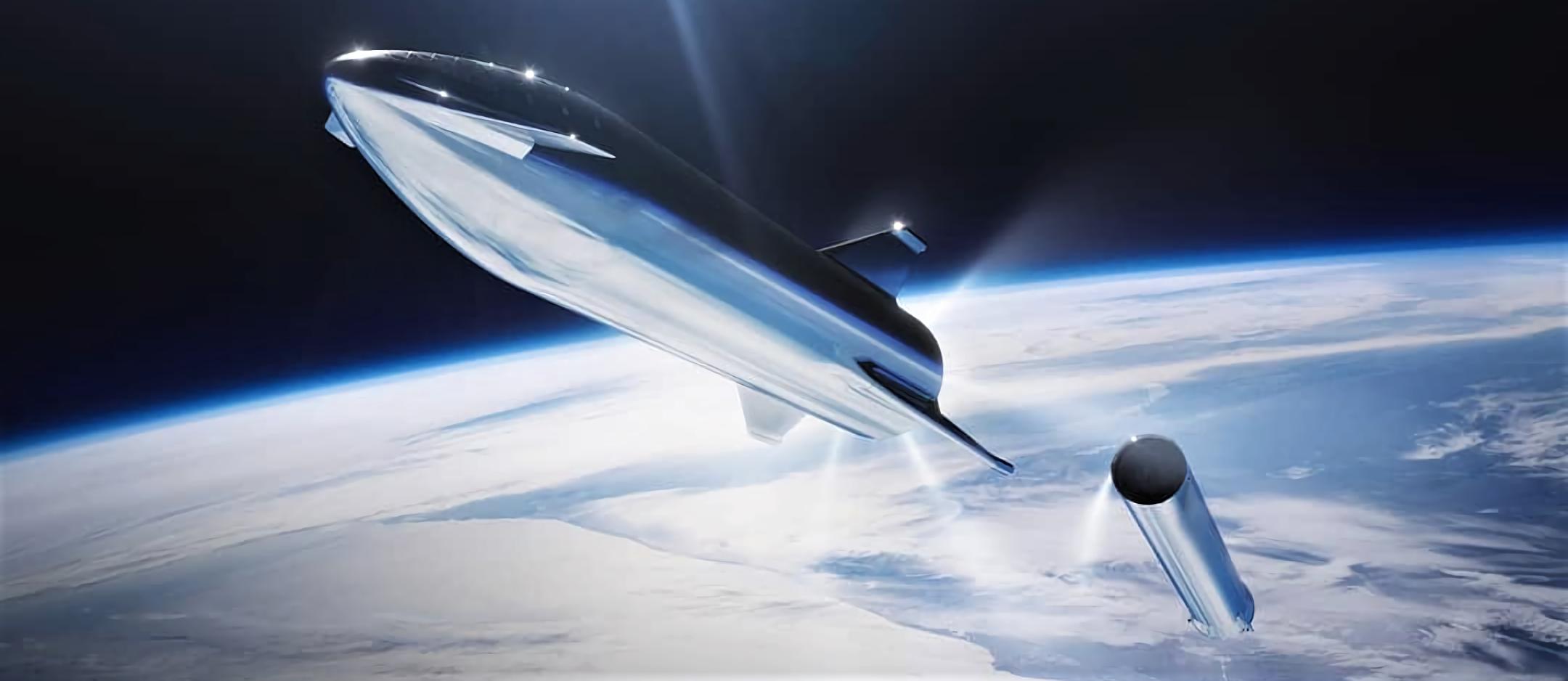
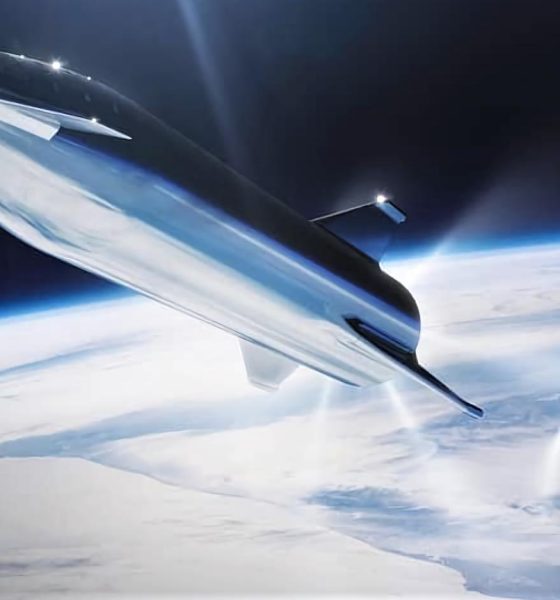
News
SpaceX’s first Super Heavy hardware is already being built at Florida Starship campus
Based on some basic analysis of recent photos of SpaceX’s East Coast Starship facility, situated in Cocoa, Florida, SpaceX has almost certainly begun fabricating and staging hardware that will eventually become part of the company’s first Super Heavy booster prototype.
This is by no means surprising but it does confirm the reasonable assumption that SpaceX is already working hard to ensure that the first Super Heavy booster(s) can be assembled as quickly as possible. Additionally, SpaceX appears to have started clearing brush in the process of preparing to transport the Florida orbital Starship prototype (“Mk2”) to SpaceX’s Pad 39A launch facilities, dozens of miles away.
Counting rings
The aforementioned “basic analysis” is more or less comprised of looking for and counting the massive steel rings that SpaceX has decided to build its Starships (and Super Heavy boosters) out of. By all appearances, SpaceX is doing nearly everything short of milling and preparing the raw materials (steel) internally. In Florida and Texas, giant rolls of stainless steel are delivered to the worksite by semi-truck, where SpaceX technicians prepare the rolls for sectioning (likely with a plasma torch or laser) and any necessary machining.
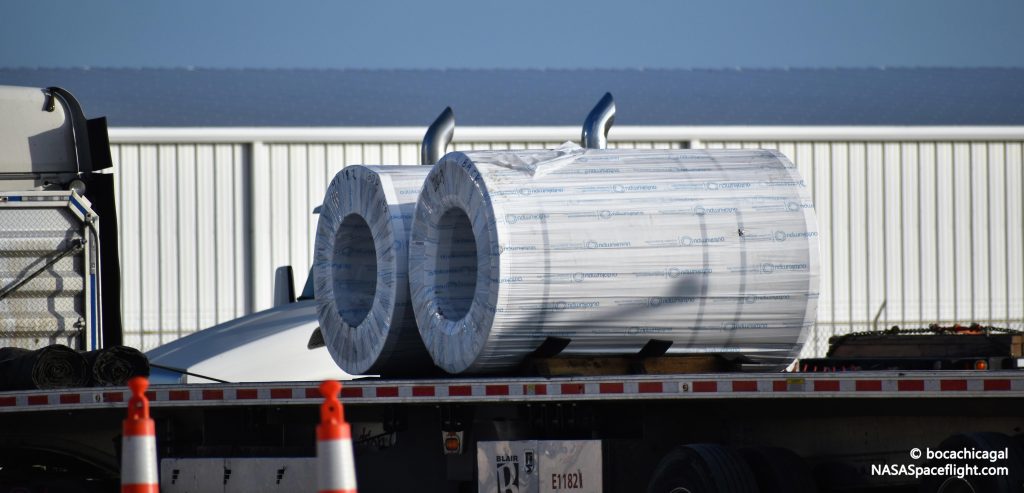
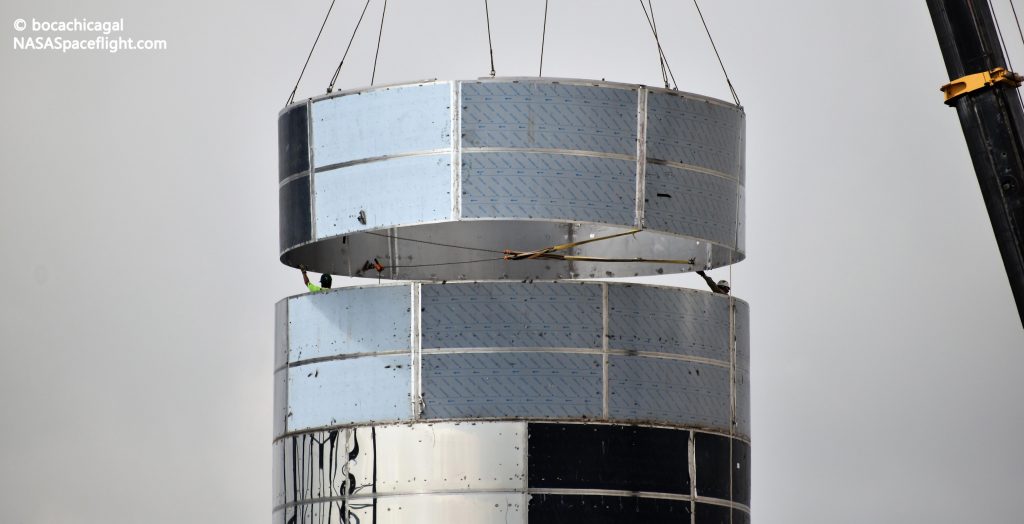
Intriguingly, SpaceX’s Texas and Florida teams are using different sizes of sheets – Florida has gone for taller segments while Texas uses rings that are a fair bit shorter ring, welding two rings together before installing each section on Starship. Florida’s rings are roughly 1.8m (6 ft; +/- 5%) tall.
In August alone, Cocoa has effectively doubled the height of the barrel section of its Mk2 orbital Starship prototype, jumping from 7-8 to 15 steel rings. The barrel section is now ~28m (90 ft) tall and Starship Mk2’s pointed nose section is still approximately 20-22m (65-70 ft) tall, adding up to a stacked height of 48-50m, approximately 10% shy of its final 55m (180 ft) height. Assuming that SpaceX hasn’t stretched Starship further since CEO Elon Musk’s September 2018 update, this leaves Starship Mk2 around 2-4 rings and a small nose cap shy of its full height (excluding legs).
Super Heavy rising
This brings us to even more recent views of SpaceX’s Cocoa Starship facility, taken on August 15th by local pilot Brian (Twitter: @flying_briann). A video from the flight offers an uninterrupted ~360-degree overview of the site, including glimpses of a surprising number of staged steel rings that have completed initial welding and are waiting for stacking and integration.
Two photos taken a bit less than two weeks ago provide a decent overview of SpaceX’s Cocoa facility. Of note, six staged rings are visible, as well as four additional rings in the form of two stacked sections of two rings. Those latter two sections (four rings) have since been stacked on Starship’s tank section, bringing it to its current 15-ring, ~28m height.
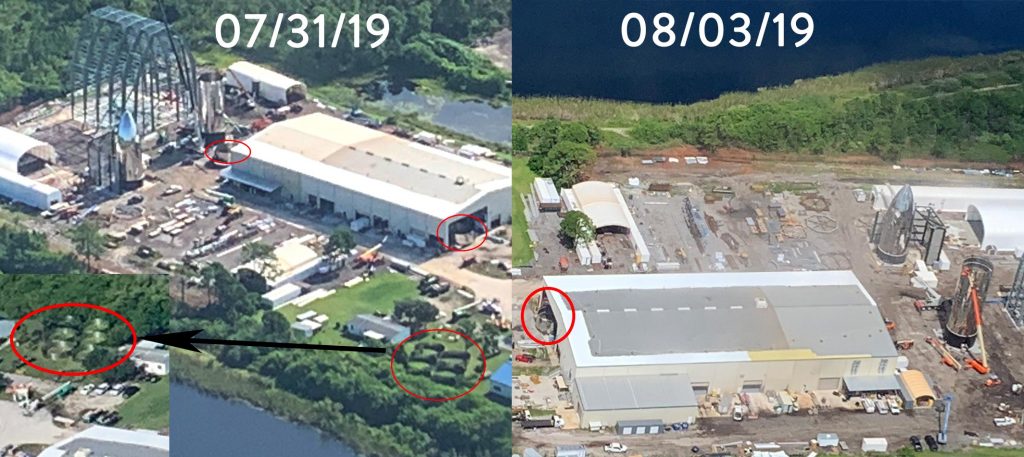
Despite the fact that Starship Mk2 appears to be just a few rings away from its final height, Brian’s August 15th overview revealed that no fewer than 11 additional rings (18m, 60 ft) are either staged or in the final stages of welding. Even if SpaceX has significantly stretched Starship over the last 10 or so months of design iteration, it seems exceedingly unlikely that Starship has grown by a full 10-12m (~20%).
Rather, these rings are probably the beginnings of SpaceX’s first Super Heavy booster prototype, a necessity before Starship can begin crucial orbital flight tests. Per the vehicle’s official 2018 specifications, Super Heavy will stand at least 63m (205 ft) tall before accounting for its landing legs/fins, requiring around 35 steel rings to complete its propellant tanks, interstage, and thrust structure.
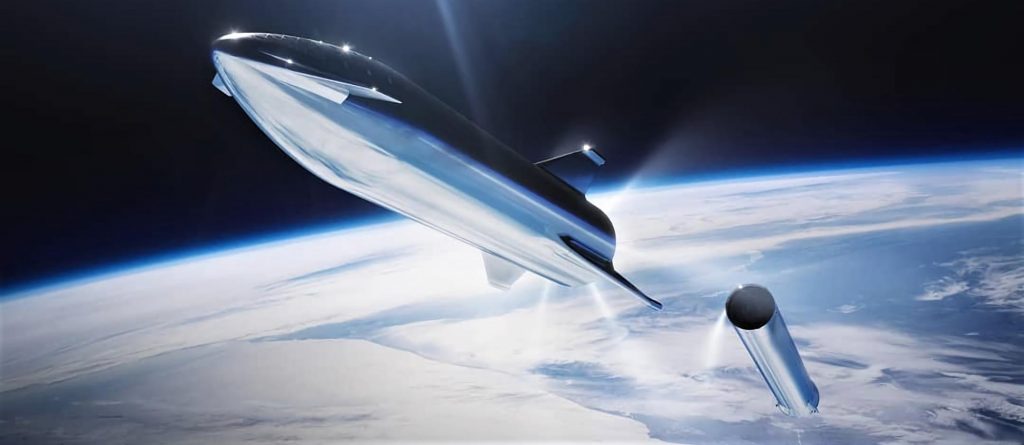
According to CEO Elon Musk, Super Heavy will likely perform its first flight tests with approximately 20 Raptor engines, eventually arriving at a full 31-37 engines depending on the configuration. Musk also believes that Starship could be ready for its first orbital flight tests as early as December 2019, implying that SpaceX’s first Super Heavy prototype(s) could be fully assembled as few as 4-5 months from now.
In reality, 2020 is far more likely for both milestones, but Musk is not exactly well-known for his conservative schedule estimates.
Check out Teslarati’s Marketplace! We offer Tesla accessories, including for the Tesla Cybertruck and Tesla Model 3.

News
Tesla rolls out new Supercharging safety feature in the U.S.
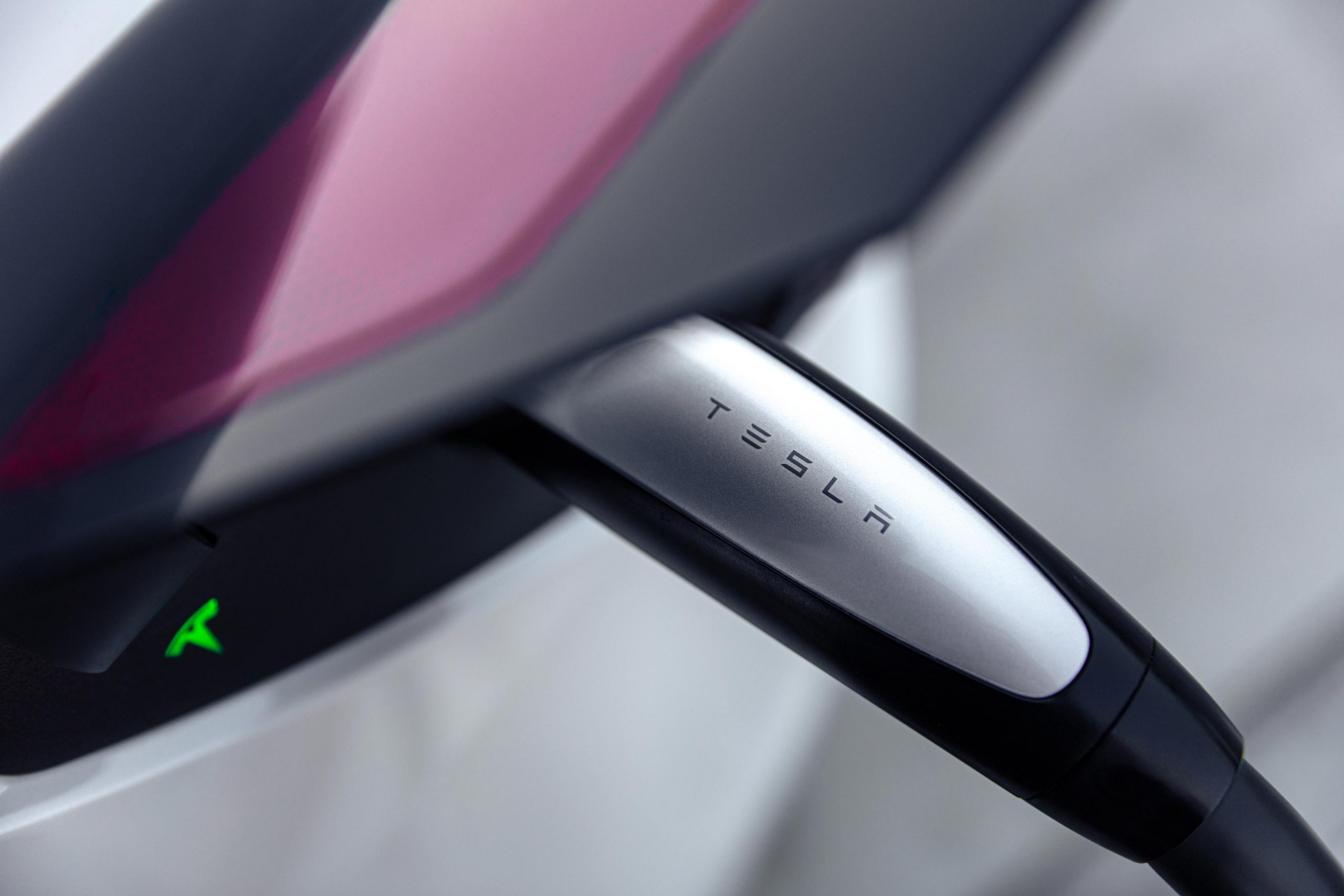
Tesla has rolled out a new Supercharging safety feature in the United States, one that will answer concerns that some owners may have if they need to leave in a pinch.
It is also a suitable alternative for non-Tesla chargers, like third-party options that feature J1772 or CCS to NACS adapters.
The feature has been available in Europe for some time, but it is now rolling out to Model 3 and Model Y owners in the U.S.
With Software Update 2026.2.3, Tesla is launching the Unlatching Charge Cable function, which will now utilize the left rear door handle to release the charging cable from the port. The release notes state:
“Charging can now be stopped and the charge cable released by pulling and holding the rear left door handle for three seconds, provided the vehicle is unlocked, and a recognized key is nearby. This is especially useful when the charge cable doesn’t have an unlatch button. You can still release the cable using the vehicle touchscreen or the Tesla app.”
The feature was first spotted by Not a Tesla App.
This is an especially nice feature for those who commonly charge at third-party locations that utilize plugs that are not NACS, which is the Tesla standard.
For example, after plugging into a J1772 charger, you will still be required to unlock the port through the touchscreen, which is a minor inconvenience, but an inconvenience nonetheless.
Additionally, it could be viewed as a safety feature, especially if you’re in need of unlocking the charger from your car in a pinch. Simply holding open the handle on the rear driver’s door will now unhatch the port from the car, allowing you to pull it out and place it back in its housing.
This feature is currently only available on the Model 3 and Model Y, so Model S, Model X, and Cybertruck owners will have to wait for a different solution to this particular feature.
News
LG Energy Solution pursuing battery deal for Tesla Optimus, other humanoid robots: report
Optimus is expected to be one of Tesla’s most ambitious projects, with Elon Musk estimating that the humanoid robot could be the company’s most important product.
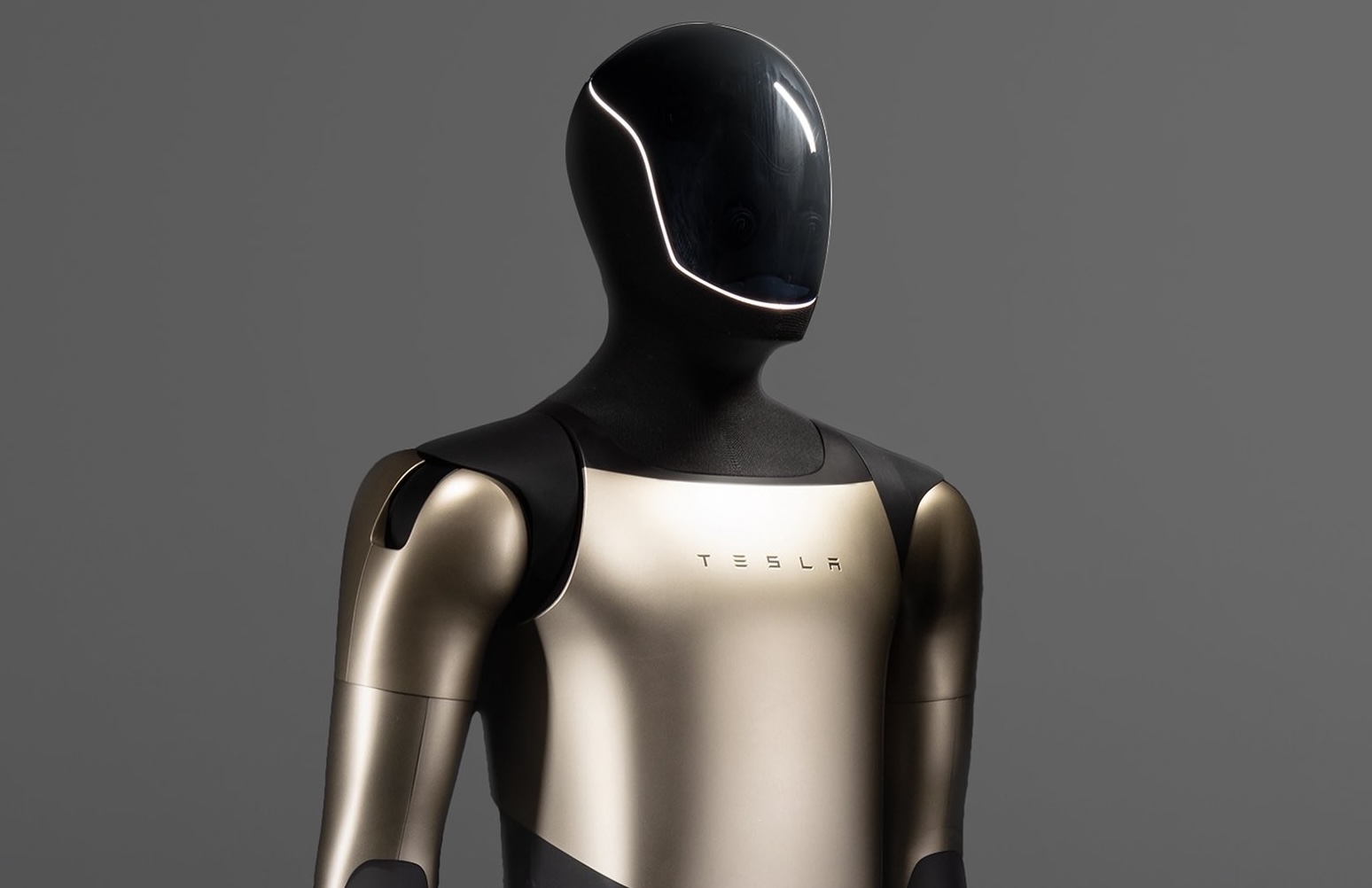
A recent report has suggested that LG Energy Solution is in discussions to supply batteries for Tesla’s Optimus humanoid robot.
Optimus is expected to be one of Tesla’s most ambitious projects, with Elon Musk estimating that the humanoid robot could be the company’s most important product.
Humanoid robot battery deals
LG Energy Solution shares jumped more than 11% on the 28th after a report from the Korea Economic Daily claimed that the company is pursuing battery supply and joint development agreements with several humanoid robot makers. These reportedly include Tesla, which is developing Optimus, as well as multiple Chinese robotics companies.
China is already home to several leading battery manufacturers, such as CATL and BYD, making the robot makers’ reported interest in LG Energy Solution quite interesting. Market participants interpreted the reported outreach as a signal that performance requirements for humanoid robots may favor battery chemistries developed by companies like LG.
LF Energy Solution vs rivals
According to the report, energy density is believed to be the primary reason humanoid robot developers are evaluating LG Energy Solution’s batteries. Unlike electric vehicles, humanoid robots have significantly less space available for battery packs while requiring substantial power to operate dozens of joint motors and onboard artificial intelligence processors.
LG Energy Solution’s ternary lithium batteries offer higher energy density compared with rivals’ lithium iron phosphate (LFP) batteries, which are widely used by Chinese EV manufacturers. That advantage could prove critical for humanoid robots, where runtime, weight, and compact packaging are key design constraints.
News
Tesla receives approval for FSD Supervised tests in Sweden
Tesla confirmed that it has been granted permission to test FSD Supervised vehicles across Sweden in a press release.
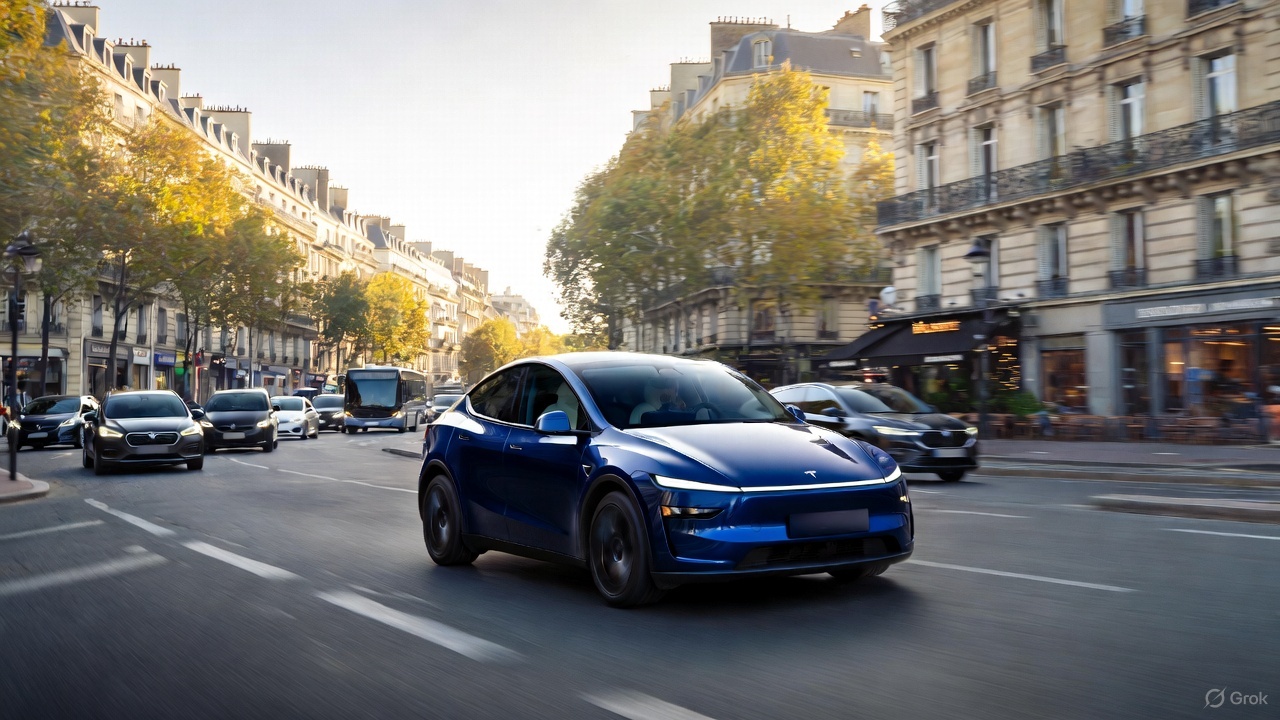
Tesla has received regulatory approval to begin tests of its Full Self-Driving Supervised system on public roads in Sweden, a notable step in the company’s efforts to secure FSD approval for the wider European market.
FSD Supervised testing in Sweden
Tesla confirmed that it has been granted permission to test FSD Supervised vehicles across Sweden following cooperation with national authorities and local municipalities. The approval covers the Swedish Transport Administration’s entire road network, as well as urban and highways in the Municipality of Nacka.
Tesla shared some insights into its recent FSD approvals in a press release. “The approval shows that cooperation between authorities, municipalities and businesses enables technological leaps and Nacka Municipality is the first to become part of the transport system of the future. The fact that the driving of the future is also being tested on Swedish roads is an important step in the development towards autonomy in real everyday traffic,” the company noted.
With approval secured for FSD tests, Tesla can now evaluate the system’s performance in diverse environments, including dense urban areas and high-speed roadways across Sweden, as noted in a report from Allt Om Elbil. Tesla highlighted that the continued development of advanced driver assistance systems is expected to pave the way for improved traffic safety, increased accessibility, and lower emissions, particularly in populated city centers.
Tesla FSD Supervised Europe rollout
FSD Supervised is already available to drivers in several global markets, including Australia, Canada, China, Mexico, New Zealand, and the United States. The system is capable of handling city and highway driving tasks such as steering, acceleration, braking, and lane changes, though it still requires drivers to supervise the vehicle’s operations.
Tesla has stated that FSD Supervised has accumulated extensive driving data from its existing markets. In Europe, however, deployment remains subject to regulatory approval, with Tesla currently awaiting clearance from relevant authorities.
The company reiterated that it expects to start rolling out FSD Supervised to European customers in early 2026, pending approvals. It would then be unsurprising if the company secures approvals for FSD tests in other European territories in the coming months.








